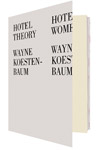The heroes of Wayne Koestenbaum’s books don’t abide by contemporary time. In Moira Orfei in Aigues-Mortes (2004), Theo Mangrove fills up twenty-five notebooks in his aging Mechanical Street home, lamenting previous nervous breakdowns, practicing obscure piano preludes, screwing the hustlers of the “Water District,” and fretting over a potential concert with a renowned circus artist. In Andy Warhol (2001), the pop artist is pictured as a savorer of stillness. His films, shot at sound speed (twenty-four frames per second) and projected at silent (eighteen frames), “take longer to show than they took to make.” This viscous effect, Koestenbaum writes, invites the viewer into a space of “almost unbearable intimacy,” “leisure,” and “contemplation.”
Hotel Theory, Koestenbaum’s latest offering, is the grand summation of his lingering thought. Less hard theory than a string of ruminations inspired by books, films, and artworks that have taken the hotel as their subject, it is the author’s most sustained effort at bringing delays and pauses to the fore. Running alongside it, Koestenbaum has planted his own novel, Hotel Women, a pulpy fling with an Oulipian gambit—it lacks the articles a, an, and the. Things are fun here, but the accommodations at Hotel Theory are more gracious, the guests more inviting. Walter Benjamin, Ava Gardner, and Martin Kippenberger all stop by, and Koestenbaum uses their visits as fodder for his own travels. He checks in to “Hotel Lautréamont” to read a John Ashbery poem, which unfolds into a reflection on the “pleasures of passivity, of being liked, of being hosted, of being wind-touched.” The hotel is at once an emblem of and a preserve for such pleasures. It is also a site where Koestenbaum produces perfectly parsed prose. Each line in Hotel Theory is sushi-grade: raw, fresh, placed just so.
It is an odd kind of traveler, however, who crosses the world never to leave his hotel room. Despite its various amenities, the hotel is also a maze of “privacy, braindeadness, aphonia, sadness, ineffability” and “a space for depression.” Hotels are dialectical places, binding together death and aliveness. Koestenbaum insists that we swallow both, however; the hotel harbors pleasures too seldom found elsewhere. It not only offers “pleasures of anonymity” but facilitates a “quest to imagine a vocation of pleasure, and to find value in the tiny, the out-of-date, and the wrong.” Though Koestenbaum insists on the hotel’s “sluttish core,” these delights are not as carnal as one might expect; more pronounced is a certain erotics of erudition. There is gratification taken here in every proper name written and every detail given, a satisfaction received from the long process of self-cultivation (and self-forgetting). Devoid of any narrative or progression, Hotel Theory is—and I mean this as a compliment—a kind of hard-core navel-gazing, the kind one does on a taut queen-size bed after having showered and raided the minibar.
Despite its evident appeals, Koestenbaum’s brand of leisure has its blind spots, and the author admits as much: “But I haven’t considered the viewpoint of hotel maids,” he writes toward the book’s conclusion. “That’s a flaw in my system, a blind spot. I’m making invisible the labor behind a hotel’s maintenance.” A disciplinarian might argue that such an omission troubles much of the author’s theory, that it haunts his “dreams of escape and social detachment.” The hotel, however, serves a purpose: it is a space of hospitality, a place of respite, a point apart. It might also be our last resort.





